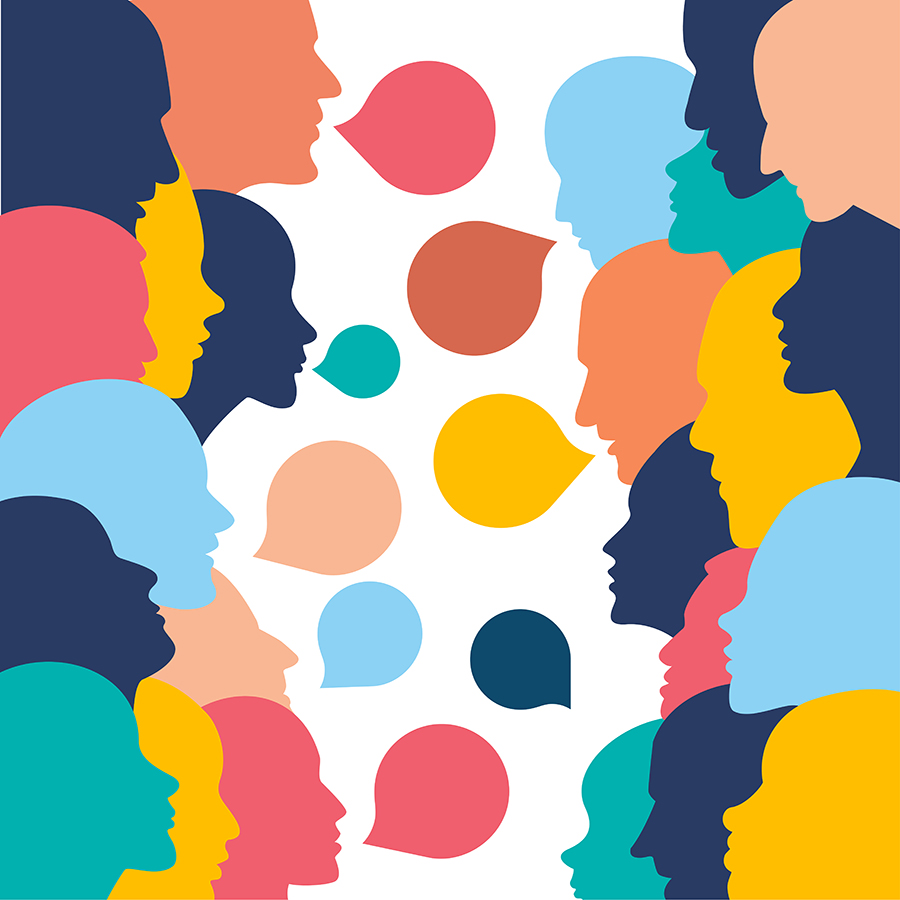Notice of privacy incident at Brigham and Women's Faulkner Hospital Learn More
Header Skipped.
Notice of privacy incident at Brigham and Women's Faulkner Hospital Learn More
Header Skipped.

May is Better Speech and Hearing Month! It’s a great opportunity to take a step back and think about the ways in which changes to our speech, hearing, voice, language, etc. may impact our ability, or that of a loved one, to engage with friends, families and communities.
“Many people are impacted by changes to communication, but these are often invisible disabilities,” says Brigham and Women’s Faulkner Hospital’s Mira Fein, MS, CCC-SLP. “We may not be aware of the significant differences that can accompany these disorders.”
Fein says there are several common communication changes we should look out for.
Dysphonia (voice disorder)
Humans produce voice in a unique way. We start by taking a breath into our lungs to power the voice. As we exhale, we move our vocal folds together, and the process of air pushing past our closed vocal folds vibrates the air, much like when the end of a balloon vibrates when you let the air escape—this is the source of our voice. We then filter and shape this vibrating air with our throat, our tongue, lips, soft palate—all the spaces above our vocal folds—to produce speech. A change to any of these systems can change the way our voices feel and sound. For example, think about a time you had to speak loudly to be heard, like during a busy Zoom meeting. How did your voice feel afterwards? It may have felt sore and sounded rough! Some people experience a similar discomfort and change in vocal quality without even raising their voice. Speech therapy can help to re-balance the subsystems that support voice production, such as training an individual to better coordinate breath support with voicing.
Dysarthria (speech sound disorder)
Speech is an incredibly complex system that relies on precise movements of the same structures described above: lips, tongue, soft palate, etc. A change in our ability to control any of the muscles that we use for speech can lead to slurred or slowed sounds that may be difficult to understand. This can happen following a stroke, a traumatic brain injury and even after something as seemingly mundane as starting a new medication. Speech therapy can help you learn strategies to compensate for a change in speech sound production. For example, your speech-language pathologist may help you to practice particularly difficult sounds in different contexts, practice scripts to support conversation in specific environments or with specific conversation partners, just to name a few!
Aphasia (language disorder)
Language refers to the words we use and the way we use them to express our thoughts. This includes writing, reading, speaking and processing new spoken and written information. In order to produce language, one must form a message, plan a motor program and put it to action. A difference in one’s ability to perform any of these actions can alter the way they interact with both people and objects in their environment. Consider the last time you had an object’s name on the tip of your tongue but just couldn’t recall the word. Maybe you were able to describe the item and continue the conversation, or maybe you just abandoned the idea and changed topics. This is normal when it happens once in a while, but when this happens with increased frequency or severity, it may suggest a language disorder like aphasia. Aphasia can occur due to a stroke, brain injury, progressive disease or any number of other conditions that change our brain function. Speech pathologists can help to evaluate changes in language and develop treatment plans that help you to continue your daily activities and interactions.
Hearing Loss
Any time you hear a sound—from something as quiet as a pin hitting the floor to something as loud as a baby crying—your eardrum is vibrating hundreds and thousands of times. Sound waves enter your ear and travel through the ear canal to your eardrum. Once it hits your eardrum, it vibrates and sends vibrations through tiny bones in your ear. These bones help to stimulate tiny hairs in your ear that send a signal to your brain. Everything about this system is unbelievably small and precise, and can easily be disrupted—by genetics, noise exposure, an illness, or the natural aging process. Since we’ve started wearing masks during the COVID-19 pandemic, many of us have had the experience of difficulty hearing someone without the ability to read their lips. This is a small taste of what it may feel like to have hearing loss. This loss in auditory input can impact speech and language development, new learning, and social engagement. If you think that you or a loved one are experiencing changes to your hearing, reach out to an audiologist. An audiologist can help to identify, evaluate, and manage hearing loss. A speech-language pathologist can help you learn compensatory strategies for the hearing loss, like minimizing background noise, positioning yourself close to the speaker, or retraining speech sounds that have changed since experiencing hearing loss.
If you need support managing any of these conditions, or have a related condition that you would like to learn more about, talk to your primary care provider about placing a referral to Speech-Language Pathology at Brigham and Women’s Faulkner Hospital. If you are a provider and your patients are asking for support from and Speech-Language Pathology, please call 617-983-7271 or send a referral to our service.
Looking for more news from BWFH? Go to News to find articles about health, updates to our programs and services and stories about staff and patients.
Go to News